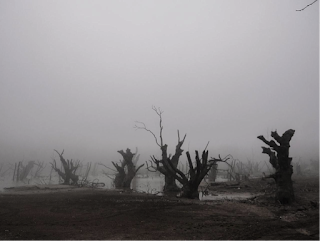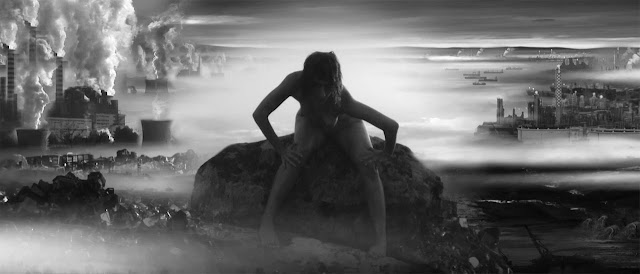Defining the Anthropocene
 |
The present blog will
approach the largest issues currently faced by the environmental movement
through the critical lens of political ecology. Using a combinatory analysis,
drawing on present, past and (why not? even) future material from philosophy, the
academia, art, environmentalism, popular culture and multiple other knowledge
sources, this platform calls for the reader to be alert, curious, attentive,
involved.
Think we
must. We must
think.
—Stengers and Despret, Women Who Make a Fuss
—Stengers and Despret, Women Who Make a Fuss
A recurring theme of
the blog will be the idea that the world’s biggest crises, the socioecological
disaster we are facing, cannot be fixed unilaterally; it demands an
interdisciplinary, collective, democratic grassroots involvement, commitment by
each and every one of us. Feminist theorist Donna Haraway is asking us to ‘Stay with the Trouble’ and this is a call we may want to respond to
and even amplify.
Moving on to the first
subject: Defining the Anthropocene. This term is controversial for many
different reasons. The claim that the Anthropocene began with the industrial
revolution has been contested. Geologically, processes that have been
associated with the Anthropocene, such as extensive release of greenhouse house
gases and landscape change (in the form of deforestation and conversion of
forest to farmland) due to human activities, have been documented as early as 2000 years ago. In fact,
pre-industrial populations altered the climate so much that they have delayed
the next glacial period by thousands of years.
Geology and sociology
intersect, as Lewis et al (2015) suggest that the Orbis Spike (1610) is the functional starting point of the
Anthropocene, as colonialism and spikes in global trade and coal use
fundamentally altered climate systems. Political ecologist Jason Moore urges us to transcend fixed temporal limitations and explain
the current socio-ecological crisis, by looking at the history of human
dominance relations with both himself and nature through ecological time and
space, in what he coins as the Capitalocene.
The term
‘Anthropocene’ is also linguistically problematic. There are two counterparts:
‘Anthropos’ (Greek for ‘Human’) and ‘cene’ (from the Greek ‘καινός’, or
‘new’). The ‘new’ dimension, as seen, is mostly contested by geological data.
The first counterpart of the word ignores social history and assigns equal
responsibility for the current crisis to the whole of humanity, although its
benefits and consequences are unevenly distributed across different societies.
As Moore argues, echoed by Micher Serres in his book ‘Times of
Crisis’, assigning a centrepiece role to humans as dictating the course of
the planet only enhances the ideological narrative that lead us to the current
crisis in the first place. Which is mostly why we are currently contending with
geo-engineering to solve the crisis. As architects of the
future, it is up to us to find technocratic fixes to allow for so-much-more
leeway for a ‘Business-as-usual’ response to this time of crises.
Photo Credits: Tassos Vrettos




Hey Chris! Awesome first piece- I'd never heard of the concept of a Chthulucene and it offers an interesting, alternative perspective to the Anthropocene. I was curious that you highlighted the Orbis Spike as a geological marker to begin the Anthropocene. What are your opinions about theories that the Anthropocene's beginning should be marked around the 1950s (Great Acceleration) or the Ruddiman theory that it should be marked by the Neolithic Revolution?
ReplyDeleteAlthough reading through all these papers, analysing the geological evidence, has proven very interesting, I am strongly leaning towards Moore's ideas of abolishing the term 'Anthropocene' all-together and adopting a more fluid explanation for such a complex issue, not fixed at any given point in time, but rather a culmination of processes and relationships across human history
DeleteI think I agree with you (and Moore!) that the term Anthropocene taints the entirety of humanity under one brush- which is a little unfair given the inherent inequity in how economic prowess (at the expense of environmental health) has benefited certain groups of humanity over others. However, couldn't you argue that we, as humanity, are all responsible for (and would benefit from) developing more sustainable modes of living (albeit to different degrees) and therefore at least the Anthropocene provides a universal impetus for us to work together?
DeleteI think that the cultural and linguistic significance attached to using the term 'Anthropocene' is too important to ignore (for all the reasons discussed above).
DeleteYes, we do need to work together, now more than ever. That is why I am keen to adopt terms like the Capitalocene or the Cthulucene; the first term isolates the problem that we should all work to resolve. The second term provides a framework on how we should go about doing that work (i.e. reevaluating our relationships with eachother and nature).
Hey Chris, enjoyed reading this! Was just wondering to what extent you agreed with the statement that 'it's not as important to identify when the Anthropocene started as to acknowledge that we're currently living in it'?
ReplyDeleteHi, thank you! I think it's important to look at the history that lead to the creation of today's socioecological crisis (while acknowledging that indeed we are now living in a time of crisis), but as I said, I do not seek a fixed point in time to define the functional start of the Anthropocene. I feel like the answer is more fluid and complex
Delete